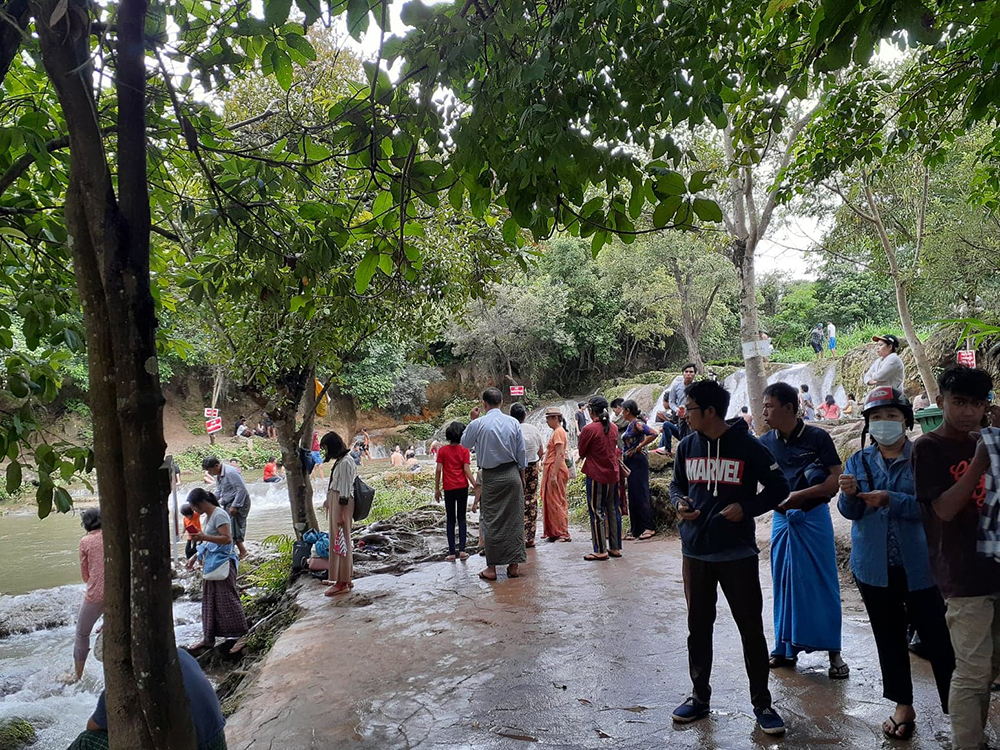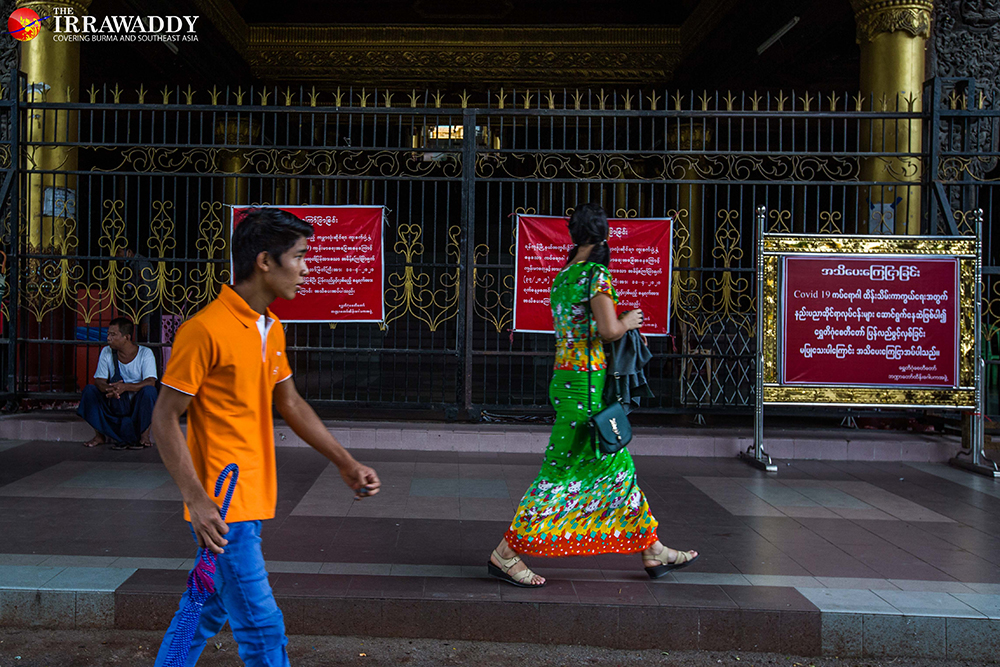MANDALAY—During the recent long weekend, which included two public holidays, a number of local travel destinations in Myanmar that have been hard-hit by the COVID-19 pandemic, such as Bagan, Mandalay, Pyin Oo Lwin, Loikaw, Kalaw, Hpa-an and Mawlamyine, saw an increase in local visitors following an easing of domestic travel restrictions.
While this is welcome news for travel operators, the increasingly common sight of locals traveling without masks and failing to follow social distancing measures has prompted fears of a renewed outbreak of the virus, as many countries around the world are currently facing a resurgence of COVID-19 cases.
Daily new-case figures are spiking globally. According to the World Health Organization (WHO), as of Tuesday, the total number of confirmed cases worldwide stood at 18,142,718 with 691,013 deaths in 213 countries. In Southeast Asia, including Myanmar, the number of confirmed cases is over 290,000. Recent sudden increases in COVID-19 cases in Indonesia, the Philippines, Singapore and Vietnam have alarmed ASEAN member countries. Once globally hailed for its initial success in combating the virus, Vietnam today reported 20 new cases for a total of 652, and is struggling to contain a recent spike.
As of Wednesday morning, Myanmar had reported 356 COVID-19 cases with six deaths since the country’s first case was confirmed in late March. The country started its preparedness for and response to the disease as early as January, something the WHO’s office in Myanmar cited as a reason for the country’s relative success against the disease so far. However, despite an initial wave of alarm over COVID-19 in the country, as vigilance against the spread of the disease wanes, questions are growing over whether Myanmar will be able to maintain its good track record.
Local civil society groups and public health workers said the recent spikes in cases in many ASEAN countries should serve as a warning that a second wave can occur once initial COVID-19 restrictions are lifted.
“Since the current number of confirmed cases is still low in our country, and the government has eased some of the restrictions, many believe this pandemic is almost over. Some even think it is over already,” said U Aung Myo Min, director of Equality Myanmar.
The rights activist said many locals think wearing a mask is unnecessary, and believe the virus no longer poses a danger, as local transmissions remain rare.

“As the new confirmed cases found [recently] were all imported, locals think the pandemic is over in the country. Some even say they aren’t worried about it anymore, as it is not being transmitted locally, which is very troubling,” he added.
Myanmar began to ease some COVID-19 restrictions in June, allowing restaurants, teashops and hotels to reopen. Domestic travel has resumed, although pilgrimage tours to pagodas and temples are still prohibited.
However, a midnight-to-dawn curfew remains in effect, and a closure order imposed on religious buildings and other public places has been extended to Aug. 15.
The Ministry of Health and Sports (MOHS) has eased its restriction on the number of persons allowed at public gatherings, which can now be attended by up to 15 persons under an order that took effect on Aug. 1. The ministry has warned people not to let their guard down against the virus and continues to encourage members of the public to wash their hands and practice social distancing. But with more and more people returning to the streets, it seems the warnings have fallen on deaf ears.
A spokesperson for the ministry could not be reached for comment.
Public health workers said locals mistakenly believe the easing of the restrictions is proof that the COVID-19 pandemic has been contained in the country.
“The novel coronavirus is very tricky; we can’t know how many of us will have contact with it, or when. We don’t need to panic, but we need to be cautious at every second, and need to practice a ‘new normal’ lifestyle to live with COVID-19,” explained Dr. Win Ko Ko Thein, a physician and social influencer who frequently publishes health-related articles.
The public health expert said that while the MOHS has broadcast educational programs about COVID-19 prevention on television and Facebook, strict rules and laws—backed up by punishments—are also needed, as most people across the country are failing to wear masks or follow preventive measures.
“The government cannot ban or lockdown the country forever. It has to ease some restrictions. On the other hand, the government should tighten the rules and regulations, and punish those who do not wear masks or follow social distancing instructions,” he said.
Health workers said the government needs to keep educating and pressing locals to stay vigilant about COVID-19 so that they can adjust to a “new normal”.
“In my opinion, the government needs to press the public more to practice the ‘new normal’ lifestyle. It needs to continue to conduct education campaigns and introduce punishments until the ‘new normal’ is practiced effectively,” he added. “All of us need to follow the instructions strictly and practice the ‘new normal’ precisely.”

Public health workers think Myanmar people are losing their interest in the COVID-19 pandemic, as most of the new confirmed cases in recent months have been imported.
Myanmar reported one new imported case on Wednesday morning, bringing the total number of confirmed COVID-19 cases to 356, with 302 patients having recovered.
Meanwhile, the Ministry of Transport and Communications announced over the weekend that bans on international flights will be extended till the end of August.
The decision, which is aimed at controlling the spread of the virus through air travel, has eased the worries of locals, but health workers warn that a spike in local transmissions and a second wave of infections is possible.
“Locals cooperated with the government in the early days, but they do not care about the virus at all, as they think its spread in the country is now under control, or that the country has no more cases, or that the virus only affects people who go abroad,” said Dr. Sid Naing, country director of Marie Stopes Myanmar.
Dr. Sid Naing said Myanmar was lucky because it was not seeing huge numbers of foreign visitors at the time the virus outbreak began in early 2020.
He added that the government’s efforts to manage the outbreak had been remarkable, with the right decisions being made and good cooperation between government institutions, health workers and local civil society groups effectively lowering the risk of transmission.
However, he said, “Having no local transmissions and seeing only a few confirmed cases does not mean the pandemic is over. We are sitting on a powder keg. A tiny spark that comes out of nowhere could see it explode at any time. This powder keg is the result of people who no longer wear masks, do not wash their hands frequently, fail to practice social distancing and do whatever they want regardless of the COVID-19 preventive measures.”
The public health workers also saw room for improvement in the government’s actions with regard to COVID-19 preventive measures.
“Educational programs alone are not enough. We need to learn lessons from other countries, which are battling second waves of COVID-19. The government needs to impose rules, regulations and punishments so that everyone strictly follows the guidelines,” Dr. Sid Naing added.
You may also like these stories:
Myanmar Health Minister Urges Renewed Vigilance to Prevent Second COVID-19 Wave
Myanmar to Lift Ban on Foreign Travel for Citizens With Urgent Business

















